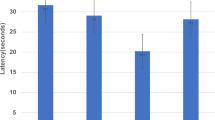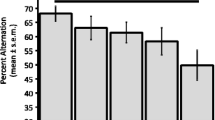Abstract
Scopolamine hydrobromide was administered intravenously to 23 normal subjects (40–89 years) in doses of 0.1 mg, 0.25 mg, and 0.5 mg, in a doubleblind, placebo-controlled, random-order fashion. The effects of scopolamine, as compared to placebo, were assessed using a comprehensive cognitive test battery, as well as behavioral and physiological measures. Scopolamine produced the expected dose-dependent impairments in most of the cognitive functions assessed. Behavioral and physiological measures were also affected, but only minimally. More importantly, there was a significant overall correlation between age and scopolamine-impaired performances on psychomotor speed, short-term recall, visual tracking speed, visuo-motor coordination, and sequencing ability. There was, however, some inter-individual variability in this phenomenon. The results provide further evidence that cholinergically mediated cognitive functions show an increased sensitivity to scopolamine with age, albeit with heterogeneity that bears further investigation.
Similar content being viewed by others
References
Allen SJ, Benton JS, Goodhardt MJ et al. (1983) Biochemical evidence of selective nerve cell changes in the normal aging human and rat brain. J Neurochem 41:256–265
Bartus RT, Dean RL, Beer B, Lippa AS (1982) The cholinergic hypothesis of geriatric memory dysfunction. Science 217:408–417
Battig W, Montague N (1969) Category norms for verbal items in 56 categories. J Exp Psychol Monogr 80:1–43
Beatty WW, Butters N, Janowsky DS (1986) Patterns of memory failure after scopolamine treatment: implications for cholinergic hypotheses of dementia. Behav Neurol Biol 45:196–211
Benton AL (1963) The revised visual retention test: clinical and experimental applications. The Psychological Corporation, New York
Broks P, Preston GC, Traub M, Poppleton P, Ward C, Stahl SM (1988) Modeling dementia: effects of scopolamine on memory and attention. Neuropsychologia 26:685–700
Buschke H (1973) Selective reminding for analysis of memory and learning. J Verb Learn Verb Behav 12:543–550
Caine ED, Weingartner H, Ludlow DL, Cudahy EA, Wehry S (1981) Qualitative analysis of scopolamine-induced amnesia. Psychopharmacology 74:74–80
Crow TJ, Grove-White IG (1973) An analysis of the learning deficit following hyoscine administration to man. Br J Pharmacol 49: 322–327
Curran HV, Schifano F, Lader M (1991) Models of memory dysfunction? A comparison of the effects of scopolamine and lorazepam on memory, psychomotor performance and mood. Psychopharmacology 103:83–90
Decker MW (1987) The effects of aging on hippocampal and cortical projections of the forebrain cholinergic system. Brain Res Rev 12:423–438
Drachman DA, Leavitt J (1974) Human memory and the cholinergic system: a relationship to aging? Arch Neurol 30:113–121
Dunne M, Hartley LR (1986) Scopolamine and the control of attention in humans. Psychopharmacology 89:94–97
Esheer D, Schrock B (1986) Attention. In: Haney HJ (ed) Experimental techniques in human neuropsychology. Oxford University Press, New York
Fleiss JL (1986) The design and analysis of clinical experiments. Wiley, New York
Flicker C, Serby M, Ferris SH (1990) Scopolamine effects on memory, language, visuospatial praxis and psychomotor speed. Psychopharmacology 100:243–250
Flicker C, Ferris SH, Serby M (1992) Hypersensitivity to scopolamine in the elderly. Psychopharmacology 107:437–441
Folstein MF, Folstein SE, McHugh PR (1975) Mini-mental state: a practical method for grading the cognitive state of patients for the clinician. J Psychiatr Res 12:189–198
Frith CD, Richardson JTE, Samuel M, Crow TM, McKenna PJ (1984) The effects of intravenous diazepam and hyoscine upon human memory. Q J Exp Psychol 36A:133–144
Gibson G, Peterson C, Jenden DJ (1981) Brain acetylcholine declines with senescence. Science 213:674–676
Hachinski VC, Iliff LD, Zilhka E, KuBoulary GH, McAllister VL, Marshall J, Russell RWR, Symon L (1975) Cerebral blood flow in dementia. Arch Neurol 32:632–637
Hamilton M (1960) A rating scale for depression. J Neurol Neurosurg Psychiatry 23:56–62
Huff FJ, Mickel SF, Corkin S, Growdon JH (1988) Cognitive functions affected by scopolamine in Alzheimer's disease and normal aging. Drug Dev Res 12:271–278
Kopelman MD, Corn TH (1988) Cholinergic ‘blockade’ as a model for cholinergic depletion. Brain 111:1079–1110
McGeer PL, McGeer EG, Suzuki J, Dolman CE, Nagai T (1984) Aging, Alzheimer's disease, and the cholinergic system of the basal forebrain. Neurology 34:741–745
Messerli P, Seron X, Tissto R (1979) Quelques aspects des troubles de la programmation dans le syndrome frontal. Arch Suisses de Neurol Neurochirurg Psychiatrie 125:23–25
Mesulam M-M, Mufson EJ, Rogers J (1987) Age-related shrinkage of cortically projecting cholinergic neurons: a selected effect. Ann Neurol 22:31–36
Molchan SE, Martinez RA, Hill JL, Weingartner HJ, Thompson K, Vitiello B, Sunderland T (1992) Increased cognitive sensitivity to scopolamine with age and a perspective on the scopolamine model. Brain Res Rev 17:216–226
Nissen MJ, Knopman DS, Schacter DL (1987) Neurochemical dissociation of memory systems. Neurology 37:789–794
Nordberg A, Winblad B (1981) Cholinergic receptors in human hippocampus — Regional distribution and variance with age. Life Sci 29:1937–1944
Overall JE, Beller SA (1984) The Brief Psychiatric Rating Scale (BRRS) in geropsychiatric research: I Factor structure on an inpatient unit. J Gerontol 39:187–193
Parrott AC (1986) The effects of transdermal scopolamine and four dose levels of oral scopolamine (0.15, 0.3, 0.6, and 1.2 mg) upon psychological performance.Psychopharmacology 89:347–354
Patel SV, Tariot PN (1991) Pharmacologic models of Alzheimer's disease. Psychiatr Clin N Am 14:287–308
Petersen RC (1977) Scopolamine induced learning failures in man. Psychopharmacology 52:283–289
Ray PG, Meador KJ, Loring EW, Zamrini XH, Buccafusco JJ (1992) Central anticholinergic hypersensitivity in aging. J Geriatric Psychiatr Neurol 5:72–77
Reitan RM, Wolfson D (1985) The Halstead-Reitan neuropsychological test battery: theory and application. Neuropsychological Press, Tucson
Richardson JS, Miller PS, LeMay JS, Jyu CA, Neil SG, Kilduff CJ, Keegan DL (1985) Mental dysfunction and the blockade of muscarinic receptors in the brain of the normal elderly. Prog Neuropsychopharmacol Biol Psychiat 9:651–654
Rusted JM, Warburton DM (1988) The effects of scopolamine on working memory in healthy young volunteers. Psychopharmacology 96:145–152
Safer DJ, Allen RP (1971) The central effects of scopolamine in man. Biol Psychiatry 3:347–355
Scinto LFM, Daffner KR, Dressler D, Ransil BI, Rentz D, Weintraub S, Mesulam M, Potter H (1994) A potential noninvasive neurobiological test for Alzheimer's disease. Science 266:1051–1054
Sunderland T, Tariot PN, Cohen RM, Weingartner H, Mueller EA, Murphy DL (1987) Anticholinergic sensitivity in patients with dementia of the Alzheimer type and age-matched controls. Arch Gen Psychiatry 44:418–426
Sunderland T, Tariot PN, Newhouse P (1988) Differential responsivity of mood, behavior, and cognition to cholinergic agents in elderly neuropsychiatric populations. Brain Res Rev 13:371–389
Troster AI, Beatty WW, Staton RD, Rorabaugh AG (1989) Effects of scopolamine on anterograde and remote memory in humans. Psychobiology 17:12–18
Waugh NC, Barr RA (1980) Memory's mental tempo. In: Poon LW, Fozard JL, Cermak LS et al. (eds) New directions in memory and aging. Erlbaum, Hillsdale, NJ, pp 251–260
Wechsler D (1981) Wechsler Adult intelligence scale — revised. Psychological Corporation, New York
Wesnes K, Warburton DM (1983) Effects of scopolamine on stimulus sensitivity and response bias in a visual vigilance task. Neuropsychobiology 9:154–157
White P, Hilley CR, Goodhardt MJ, Carrasco LH, Keet JP, Williams IE, Bowen DM (1977) Neocortical cholinergic neurons in the elderly people. Lancet 1:668–671
Yamamura HI (1981) Neurotransmitter receptor alterations in age-related disorders. In: Enna SJ, Samorajski T, Beer B (eds) Brain neurotransmitters and receptors in aging and age-related disorders, vol 17. Raven, New York, pp 143–147
Author information
Authors and Affiliations
Rights and permissions
About this article
Cite this article
Tariot, P.N., Patel, S.V., Cox, C. et al. Age-related decline in central cholinergic function demonstrated with scopolamine. Psychopharmacology 125, 50–56 (1996). https://doi.org/10.1007/BF02247392
Received:
Revised:
Issue Date:
DOI: https://doi.org/10.1007/BF02247392




